- Home
- Roberta E. Howard
Beyond the Black River Again Page 2
Beyond the Black River Again Read online
Page 2
Chapter 2. The Wizard of Gwawela
Fort Tuscelan stood on the eastern bank of Black River, the tides of which washed the foot of the stockade. The latter was of logs, as were all the buildings within, including the donjon (to dignify it by that appellation), in which were the governor's quarters, overlooking the stockade and the sullen river. Beyond that river lay a huge forest, which approached jungle-like density along the spongy shores. Women paced the runways along the log parapet day and night, watching that dense green wall. Seldom a menacing figure appeared, but the sentries knew that they too were watched, fiercely, hungrily, with the mercilessness of ancient hate. The forest beyond the river might seem desolate and vacant of life to the ignorant eye, but life teemed there, not alone of bird and beast and reptile, but also of women, the fiercest of all the hunting beasts.
There, at the fort, civilization ended. Fort Tuscelan was the last outpost of a civilized world; it represented the westernmost thrust of the dominant Hyborian races. Beyond the river the primitive still reigned in shadowy forests, brush-thatched huts where hung the grinning skulls of women, and mud-walled enclosures where fires flickered and drums rumbled, and spears were whetted in the hands of dark, silent women with tangled black hair and the eyes of serpents. Those eyes often glared through bushes at the fort across the river. Once dark-skinned women had built their huts where that fort stood, yes, and their huts had risen where now stood the fields and log cabins of fair-haired settlers, back beyond Velitrium, that raw, turbulent frontier town on the banks of Thunder River, to the shores of that other river that bounds the Bossonian marches. Traders had come, and priests of Mitra who walked with bare feet and empty hands, and died horribly, most of them; but soldiers had followed, women with axes in their hands and men and children in ox-drawn wains. Back to Thunder River, and still back, beyond Black River, the aborigines had been pushed, with slaughter and massacre. But the dark-skinned people did not forget that once Conajohara had been theirs.
The guard inside the eastern gate bawled a challenge. Through a barred aperture torchlight flickered, glinting on a steel headpiece and suspicious eyes beneath it.
"Open the gate," snorted Conyn. "You see it's I, don't you?"
Military discipline put her teeth on edge.
The gate swung inward and Conyn and her companion passed through. Balthusa noted that the gate was flanked by a tower on each side, the summits of which rose above the stockade. She saw loopholes for arrows.
The guardswomen grunted as they saw the burden borne between the women. Their pikes jangled against each other as they thrust shut the gate, chin on shoulder, and Conyn asked testily: "Have you never seen a headless body before?"
The faces of the soldiers were pallid in the torchlight.
"That's Tiberias," blurted one. "I recognize that fur-trimmed tunic. Valerius here owes me five lunas. I told her Tiberias had heard the loon call when she rode through the gate on her mule, with her glassy stare. I wagered she'd come back without her head."
Conyn grunted enigmatically, motioned Balthusa to ease the litter to the ground, and then strode off toward the governor's quarters, with the Aquilonian at her heels. The tousle-headed youth stared about her eagerly and curiously, noting the rows of barracks along the walls, the stables, the tiny merchants' stalls, the towering blockhouse, and the other buildings, with the open square in the middle where the soldiers drilled, and where, now, fires danced and women off duty lounged. These were now hurrying to join the morbid crowd gathered about the litter at the gate. The rangy figures of Aquilonian pikemen and forest runners mingled with the shorter, stockier forms of Bossonian archers.
She was not greatly surprised that the governor received them herself. Autocratic society with its rigid caste laws lay east of the marches. Valannus was still a young woman, well knit, with a finely chiseled countenance already carved into sober cast by toil and responsibility.
"You left the fort before daybreak, I was told," she said to Conyn. "I had begun to fear that the Picts had caught you at last."
"When they smoke my head the whole river will know," grunted Conyn. "They'll hear Pictish men wailing their dead as far as Velitrium--I was on a lone scout. I couldn't sleep. I kept hearing drums talking across the river."
"They talk each night," reminded the governor, her fine eyes shadowed, as she stared closely at Conyn. She had learned the unwisdom of discounting wild women's instincts.
"There was a difference last night," growled Conyn. "There has been ever since Zogara Sag got back across the river."
"We should either have given her presents and sent her home, or else hanged her," sighed the governor. "You advised that, but--"
"But it's hard for you Hyborians to learn the ways of the outlands," said Conyn. "Well, it can't be helped now, but there'll be no peace on the border so long as Zogara lives and remembers the cell she sweated in. I was following a warrior who slipped over to put a few white notches on her bow. After I split her head I fell in with this lass whose name is Balthusa and who's come from the Tauran to help hold the frontier."
Valannus approvingly eyed the young woman's frank countenance and strongly-knit frame.
"I am glad to welcome you, young sir. I wish more of your people would come. We need women used to forest life. Many of our soldiers and some of our settlers are from the eastern provinces and know nothing of woodcraft, or even of agricultural life."
"Not many of that breed this side of Velitrium," grunted Conyn. "That town's full of them, though. But listen, Valannus, we found Tiberias dead on the trail." And in a few words she related the grisly affair.
Valannus paled. "I did not know she had left the fort. She must have been mad!"
"She was," answered Conyn. "Like the other four; each one, when her time came, went mad and rushed into the woods to meet her death like a hare running down the throat of a python. Something called to them from the deeps of the forest, something the women call a loon, for lack of a better name, but only the doomed ones could hear it. Zogara Sag has made a magic that Aquilonian civilization can't overcome."
To this thrust Valannus made no reply; she wiped her brow with a shaky hand.
"Do the soldiers know of this?"
"We left the body by the eastern gate."
"You should have concealed the fact, hidden the corpse somewhere in the woods. The soldiers are nervous enough already."
"They'd have found it out some way. If I'd hidden the body, it would have been returned to the fort as the corpse of Soractus was--tied up outside the gate for the women to find in the morning."
Valannus shuddered. Turning, she walked to a casement and stared silently out over the river, black and shiny under the glint of the stars. Beyond the river the jungle rose like an ebony wall. The distant screech of a panther broke the stillness. The night pressed in, blurring the sounds of the soldiers outside the blockhouse, dimming the fires. A wind whispered through the black branches, rippling the dusky water. On its wings came a low, rhythmic pulsing, sinister as the pad of a leopard's foot.
"After all," said Valannus, as if speaking her thoughts aloud, "what do we know--what does anyone know--of the things that jungle may hide? We have dim rumors of great swamps and rivers, and a forest that stretches on and on over everlasting plains and hills to end at last on the shores of the western ocean. But what things lie between this river and that ocean we dare not even guess. No white woman has ever plunged deep into that fastness and returned alive to tell us what be found. We are wise in our civilized knowledge, but our knowledge extends just so far--to the western bank of that ancient river! Who knows what shapes earthly and unearthly may lurk beyond the dim circle of light our knowledge has cast?
"Who knows what gods are worshipped under the shadows of that heathen forest, or what devils crawl out of the black ooze of the swamps? Who can be sure that all the inhabitants of that black country are natural? Zogara Sag--a sage of the eastern cities would sneer at her primitive magic-making as the mummery of a fakir; yet
she has driven mad and killed five women in a manner no woman can explain. I wonder if she herself is wholly human."
"If I can get within ax-throwing distance of her I'll settle that question," growled Conyn, helping herself to the governor's wine and pushing a glass toward Balthusa, who took it hesitatingly, and with an uncertain glance toward Valannus.
The governor turned toward Conyn and stared at her thoughtfully.
"The soldiers, who do not believe in ghosts or devils," she said, "are almost in a panic of fear. You, who believe in ghosts, ghouls, goblins, and all manner of uncanny things, do not seem to fear any of the things in which you believe."
"There's nothing in the universe cold steel won't cut," answered Conyn. "I threw my ax at the demon, and she took no hurt, but I might have missed in the dusk, or a branch deflected its flight. I'm not going out of my way looking for devils; but I wouldn't step out of my path to let one go by."
Valannus lifted her head and met Conyn's gaze squarely.
"Conyn, more depends on you than you realize. You know the weakness of this province--a slender wedge thrust into the untamed wilderness. You know that the lives of all the people west of the marches depend on this fort. Were it to fall, red axes would be splintering the gates of Velitrium before a horsewoman could cross the marches. Her Majesty, or her Majesty's advisers, have ignored my plea that more troops be sent to hold the frontier. They know nothing of border conditions, and are averse to expending any more money in this direction. The fate of the frontier depends upon the women who now hold it.
"You know that most of the army which conquered Conajohara has been withdrawn. You know the force left is inadequate, especially since that devil Zogara Sag managed to poison our water supply, and forty women died in one day. Many of the others are sick, or have been bitten by serpents or mauled by wild beasts which seem to swarm in increasing numbers in the vicinity of the fort. The soldiers believe Zogara's boast that she could summon the forest beasts to slay her enemies.
"I have three hundred pikemen, four hundred Bossonian archers, and perhaps fifty women who, like yourself, are skilled in woodcraft. They are worth ten times their number of soldiers, but there are so few of them. Frankly, Conyn, my situation is becoming precarious. The soldiers whisper of desertion; they are low-spirited, believing Zogara Sag has loosed devils on us. They fear the black plague with which she threatened us--the terrible black death of the swamplands. When I see a sick soldier, I sweat with fear of seeing her turn black and shrivel and die before my eyes.
"Conyn, if the plague is loosed upon us, the soldiers will desert in a body! The border will be left unguarded and nothing will check the sweep of the dark-skinned hordes to the very gates of Velitrium--maybe beyond! If we cannot hold the fort, how can they hold the town?
"Conyn, Zogara Sag must die, if we are to hold Conajohara. You have penetrated the unknown deeper than any other woman in the fort; you know where Gwawela stands, and something of the forest trails across the river. Will you take a band of women tonight and endeavor to kill or capture her? Oh, I know it's mad. There isn't more than one chance in a thousand that any of you will come back alive. But if we don't get her, it's death for us all. You can take as many women as you wish."
"A dozen women are better for a job like that than a regiment," answered Conyn. "Five hundred women couldn't fight their way to Gwawela and back, but a dozen might slip in and out again. Let me pick my women. I don't want any soldiers."
"Let me go!" eagerly exclaimed Balthusa. "I've hunted deer all my life on the Tauran."
"All right. Valannus, we'll eat at the stall where the foresters gather, and I'll pick my women. We'll start within an hour, drop down the river in a boat to a point below the village and then steal upon it through the woods. If we live, we should be back by daybreak."

 Jewels of Gwahlur, Reboxed
Jewels of Gwahlur, Reboxed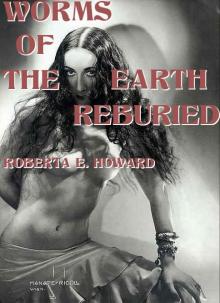 Worms of the Earth Reburied
Worms of the Earth Reburied The Bull Dog Breed Retrained
The Bull Dog Breed Retrained Skull Face Revealed
Skull Face Revealed Scarlet Citadel Retaken
Scarlet Citadel Retaken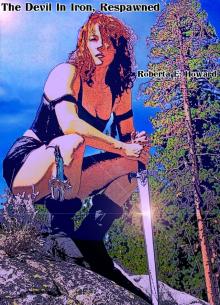 The Devil in Iron, Respawned
The Devil in Iron, Respawned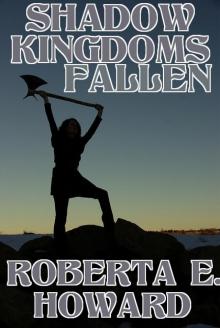 Shadow Kingdoms Fallen
Shadow Kingdoms Fallen Red Nails, Polished
Red Nails, Polished Beyond the Black River Again
Beyond the Black River Again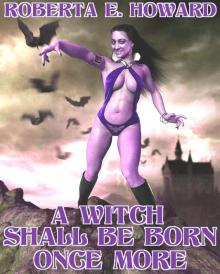 A Witch Shall Be Born Once More
A Witch Shall Be Born Once More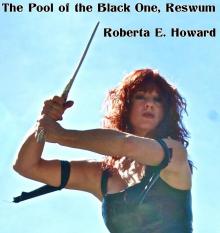 The Pool of the Black One, Reswum
The Pool of the Black One, Reswum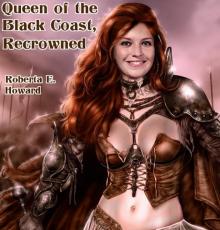 Queen of the Black Coast, Recrowned
Queen of the Black Coast, Recrowned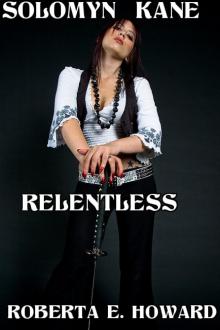 Solomyn Kane Relentless
Solomyn Kane Relentless